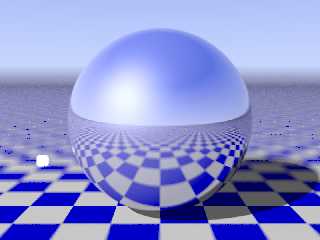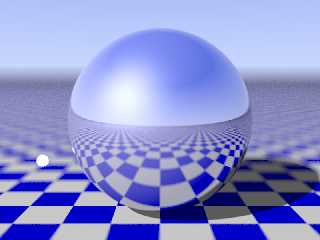|
 |
To add to my recent brags, here's focal blur:
Image #1 shows a scene rendered with original POV-Ray 3.7 beta 38; scene
is the default "checkered plane" scene template, with focal blur enabled
in the camera, and an additional highly emissive small sphere to show
the bokeh:
camera {
...
focal_point <0,0,0>
aperture 0.5
blur_samples 1000
confidence 0.95
variance 1/200
}
sphere { // emissive sphere
<-2,-0.95,2>, 0.05
texture {
pigment { color rgb <1,1,1> }
finish { emission 10.0 diffuse 0 ambient 0 specular 0 }
}
}
One nasty, clearly visible thing about POV-Ray's focal blur is the
square-ish bokeh. Occasionally you might also see six-pointed stars, but
most of all you have virtually zero control over this.
The reason for this is that POV-Ray does have a set of hexagonal bokehs,
from which it chooses depending on the blur_samples setting, but to
"fill up" to the specified blur_samples, it just fills a 2D square with
random samples.
Another nasty thing are the occasional non-blurred pixels among the
blurred behind the reflective sphere. Do what you will, you just can't
get rid of them, no matter how high you crank the focal blur settings.
The reason for this is that these are pixels where POV-Ray takes just 7
samples, then calls it a day because they happen to be almost exactly
the same.
Image #2 shows the same scene rendered with a modified version of beta
38, using the following changes:
* Additional samples are not taken randomly from a square, but using a
sequence of low-discrepancy points on a disc instead (based on a Halton
sequence).
* The "blur_samples" keyword optionally takes two parameters, in which
case the first one specifies a /minimum/ number of samples to take,
regardless of confidence and variance settings; in this particular
render, this was set to "blur_samples 20, 1000".
Note how this replaces the square-ish bokeh with a more pleasing round
one, and also avoids the occasional non-blurred pixel.
Another thing you may notice is that in image #2 the horizon appears to
be somewhat higher than in #1, as if the image was taken from a slightly
different camera location. In fact, this is not far from the truth,
because I changed yet another thing:
* When "filling up" the hard-coded bokehs with additional (sub-)random
samples, POV-Ray makes sure not to get too close to the hard-coded
samples or already-added samples; unfortunately, it does this by
modifying the direction, in a way that creates a bias downwards and to
the right. I changed this to simply pick a new (sub-)random point instead.
Post a reply to this message
Attachments:
Download 'focal_blur_test_38.png' (266 KB)
Download 'focal_blur_test_38plus.png' (258 KB)
Preview of image 'focal_blur_test_38.png'

Preview of image 'focal_blur_test_38plus.png'

|
 |




![]()